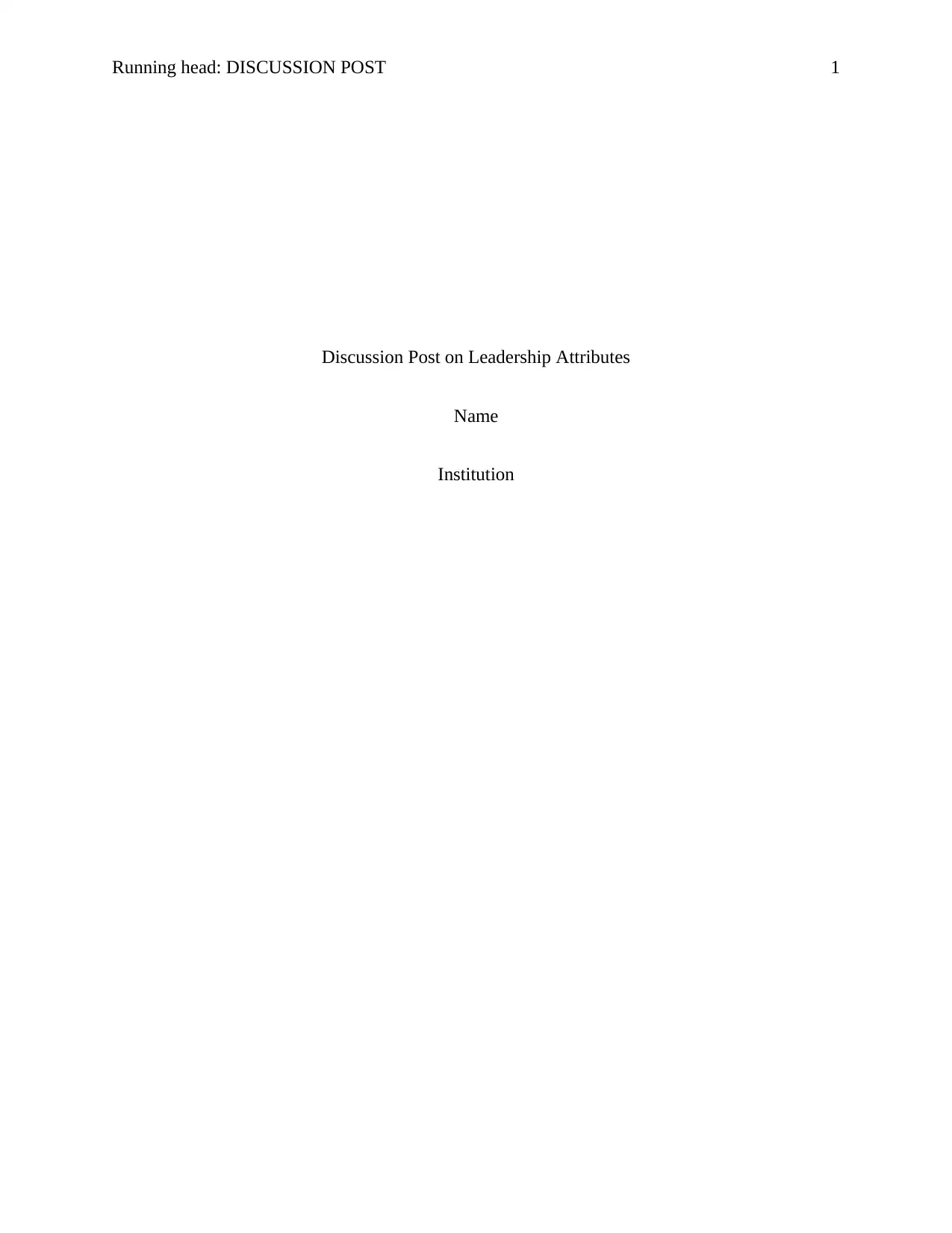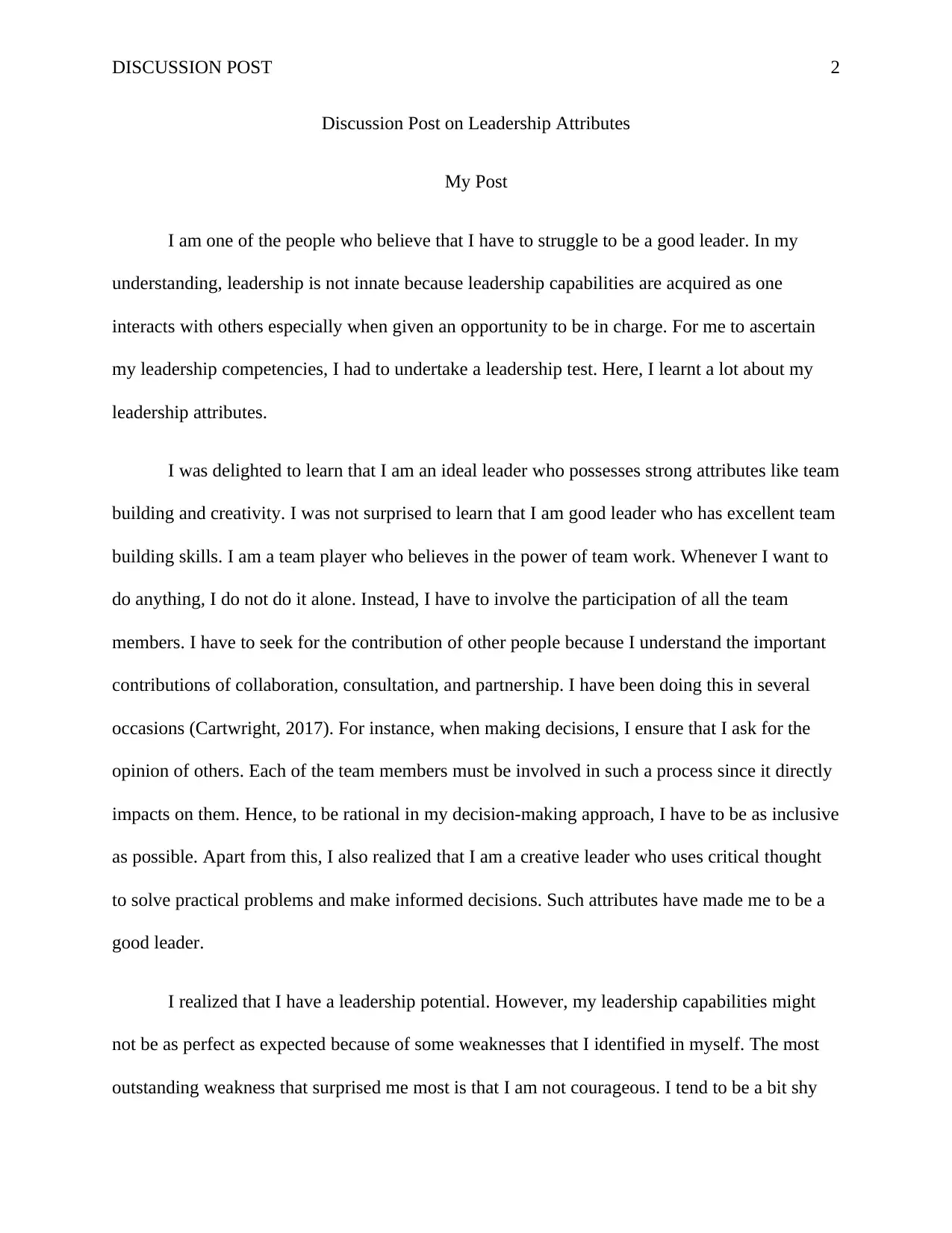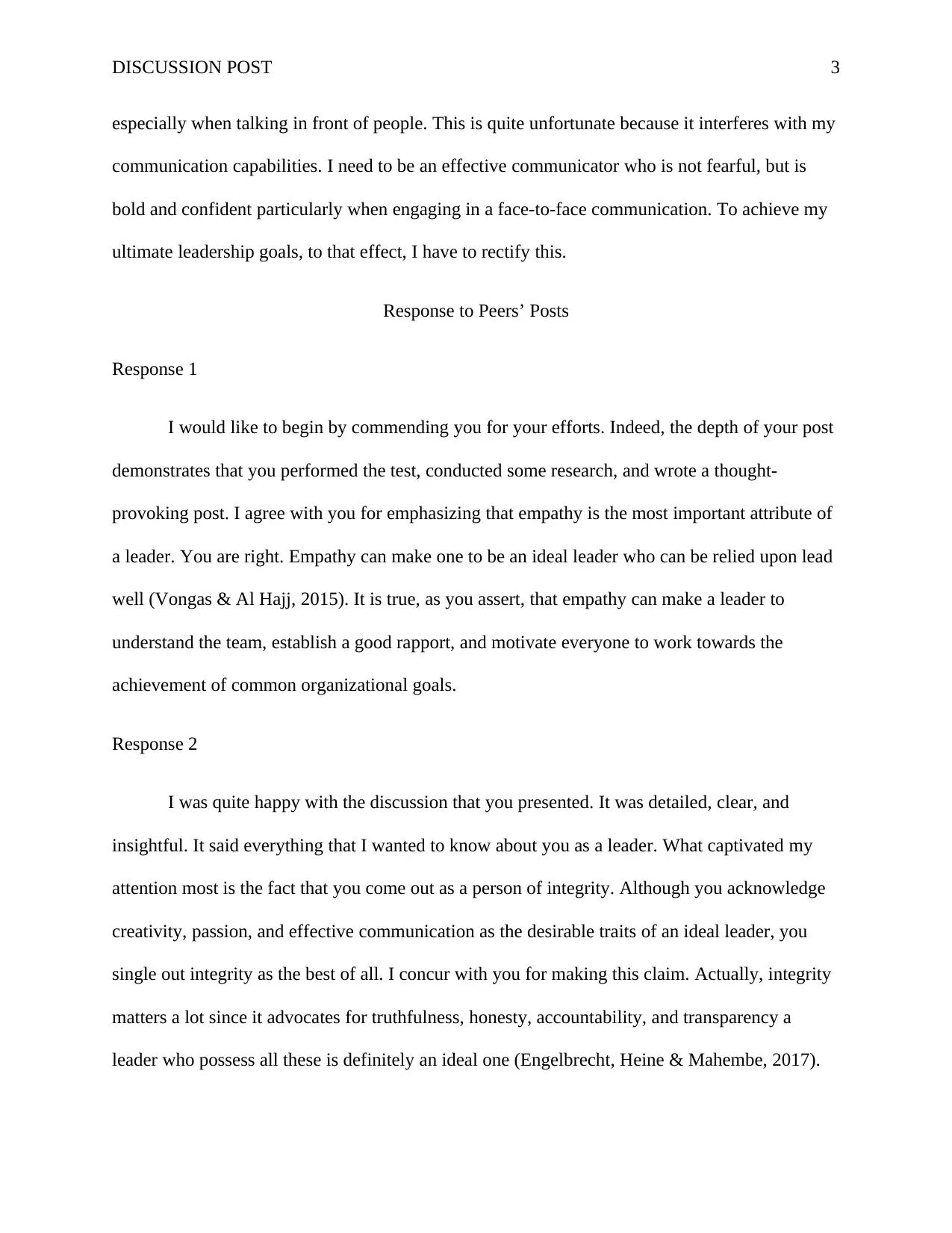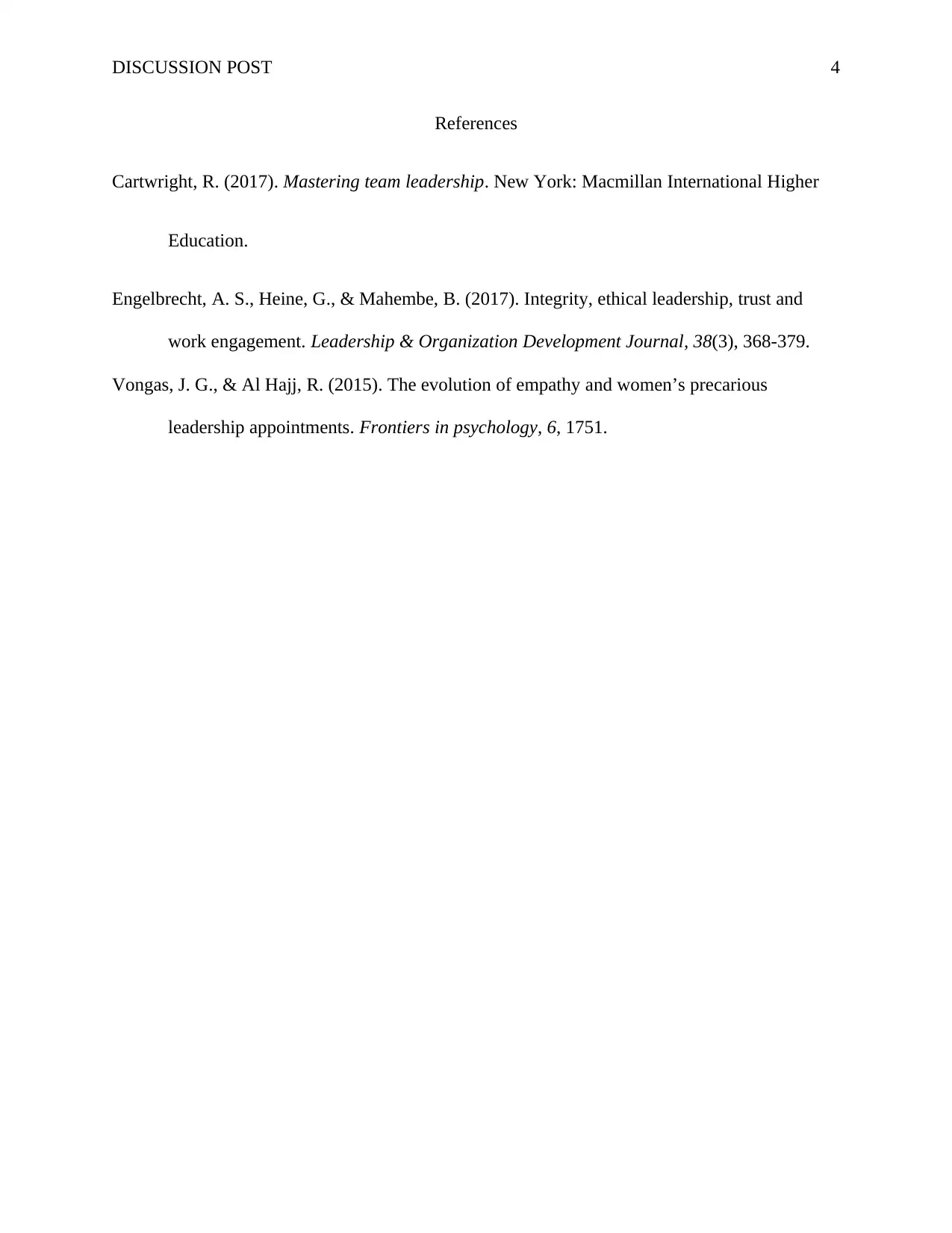Discussion Post 4: Leadership Attributes, Self-Assessment, and Peers
VerifiedAdded on 2022/10/04
|4
|776
|105
Discussion Board Post
AI Summary
This discussion post, submitted for MBA 550, analyzes the author's leadership attributes based on a self-assessment. The author identifies strengths in team building and creativity, while acknowledging a weakness in public speaking. The post also includes responses to two peer posts, commenting on their insights regarding empathy and integrity as crucial leadership qualities. The author references relevant literature to support their analysis and engage in a comprehensive discussion on leadership principles and practices, fulfilling the requirements of the module's discussion rubric. The post reflects on personal leadership capabilities and provides a detailed evaluation of leadership styles and skills.

Running head: DISCUSSION POST 1
Discussion Post on Leadership Attributes
Name
Institution
Discussion Post on Leadership Attributes
Name
Institution
Paraphrase This Document
Need a fresh take? Get an instant paraphrase of this document with our AI Paraphraser

DISCUSSION POST 2
Discussion Post on Leadership Attributes
My Post
I am one of the people who believe that I have to struggle to be a good leader. In my
understanding, leadership is not innate because leadership capabilities are acquired as one
interacts with others especially when given an opportunity to be in charge. For me to ascertain
my leadership competencies, I had to undertake a leadership test. Here, I learnt a lot about my
leadership attributes.
I was delighted to learn that I am an ideal leader who possesses strong attributes like team
building and creativity. I was not surprised to learn that I am good leader who has excellent team
building skills. I am a team player who believes in the power of team work. Whenever I want to
do anything, I do not do it alone. Instead, I have to involve the participation of all the team
members. I have to seek for the contribution of other people because I understand the important
contributions of collaboration, consultation, and partnership. I have been doing this in several
occasions (Cartwright, 2017). For instance, when making decisions, I ensure that I ask for the
opinion of others. Each of the team members must be involved in such a process since it directly
impacts on them. Hence, to be rational in my decision-making approach, I have to be as inclusive
as possible. Apart from this, I also realized that I am a creative leader who uses critical thought
to solve practical problems and make informed decisions. Such attributes have made me to be a
good leader.
I realized that I have a leadership potential. However, my leadership capabilities might
not be as perfect as expected because of some weaknesses that I identified in myself. The most
outstanding weakness that surprised me most is that I am not courageous. I tend to be a bit shy
Discussion Post on Leadership Attributes
My Post
I am one of the people who believe that I have to struggle to be a good leader. In my
understanding, leadership is not innate because leadership capabilities are acquired as one
interacts with others especially when given an opportunity to be in charge. For me to ascertain
my leadership competencies, I had to undertake a leadership test. Here, I learnt a lot about my
leadership attributes.
I was delighted to learn that I am an ideal leader who possesses strong attributes like team
building and creativity. I was not surprised to learn that I am good leader who has excellent team
building skills. I am a team player who believes in the power of team work. Whenever I want to
do anything, I do not do it alone. Instead, I have to involve the participation of all the team
members. I have to seek for the contribution of other people because I understand the important
contributions of collaboration, consultation, and partnership. I have been doing this in several
occasions (Cartwright, 2017). For instance, when making decisions, I ensure that I ask for the
opinion of others. Each of the team members must be involved in such a process since it directly
impacts on them. Hence, to be rational in my decision-making approach, I have to be as inclusive
as possible. Apart from this, I also realized that I am a creative leader who uses critical thought
to solve practical problems and make informed decisions. Such attributes have made me to be a
good leader.
I realized that I have a leadership potential. However, my leadership capabilities might
not be as perfect as expected because of some weaknesses that I identified in myself. The most
outstanding weakness that surprised me most is that I am not courageous. I tend to be a bit shy

DISCUSSION POST 3
especially when talking in front of people. This is quite unfortunate because it interferes with my
communication capabilities. I need to be an effective communicator who is not fearful, but is
bold and confident particularly when engaging in a face-to-face communication. To achieve my
ultimate leadership goals, to that effect, I have to rectify this.
Response to Peers’ Posts
Response 1
I would like to begin by commending you for your efforts. Indeed, the depth of your post
demonstrates that you performed the test, conducted some research, and wrote a thought-
provoking post. I agree with you for emphasizing that empathy is the most important attribute of
a leader. You are right. Empathy can make one to be an ideal leader who can be relied upon lead
well (Vongas & Al Hajj, 2015). It is true, as you assert, that empathy can make a leader to
understand the team, establish a good rapport, and motivate everyone to work towards the
achievement of common organizational goals.
Response 2
I was quite happy with the discussion that you presented. It was detailed, clear, and
insightful. It said everything that I wanted to know about you as a leader. What captivated my
attention most is the fact that you come out as a person of integrity. Although you acknowledge
creativity, passion, and effective communication as the desirable traits of an ideal leader, you
single out integrity as the best of all. I concur with you for making this claim. Actually, integrity
matters a lot since it advocates for truthfulness, honesty, accountability, and transparency a
leader who possess all these is definitely an ideal one (Engelbrecht, Heine & Mahembe, 2017).
especially when talking in front of people. This is quite unfortunate because it interferes with my
communication capabilities. I need to be an effective communicator who is not fearful, but is
bold and confident particularly when engaging in a face-to-face communication. To achieve my
ultimate leadership goals, to that effect, I have to rectify this.
Response to Peers’ Posts
Response 1
I would like to begin by commending you for your efforts. Indeed, the depth of your post
demonstrates that you performed the test, conducted some research, and wrote a thought-
provoking post. I agree with you for emphasizing that empathy is the most important attribute of
a leader. You are right. Empathy can make one to be an ideal leader who can be relied upon lead
well (Vongas & Al Hajj, 2015). It is true, as you assert, that empathy can make a leader to
understand the team, establish a good rapport, and motivate everyone to work towards the
achievement of common organizational goals.
Response 2
I was quite happy with the discussion that you presented. It was detailed, clear, and
insightful. It said everything that I wanted to know about you as a leader. What captivated my
attention most is the fact that you come out as a person of integrity. Although you acknowledge
creativity, passion, and effective communication as the desirable traits of an ideal leader, you
single out integrity as the best of all. I concur with you for making this claim. Actually, integrity
matters a lot since it advocates for truthfulness, honesty, accountability, and transparency a
leader who possess all these is definitely an ideal one (Engelbrecht, Heine & Mahembe, 2017).
⊘ This is a preview!⊘
Do you want full access?
Subscribe today to unlock all pages.

Trusted by 1+ million students worldwide

DISCUSSION POST 4
References
Cartwright, R. (2017). Mastering team leadership. New York: Macmillan International Higher
Education.
Engelbrecht, A. S., Heine, G., & Mahembe, B. (2017). Integrity, ethical leadership, trust and
work engagement. Leadership & Organization Development Journal, 38(3), 368-379.
Vongas, J. G., & Al Hajj, R. (2015). The evolution of empathy and women’s precarious
leadership appointments. Frontiers in psychology, 6, 1751.
References
Cartwright, R. (2017). Mastering team leadership. New York: Macmillan International Higher
Education.
Engelbrecht, A. S., Heine, G., & Mahembe, B. (2017). Integrity, ethical leadership, trust and
work engagement. Leadership & Organization Development Journal, 38(3), 368-379.
Vongas, J. G., & Al Hajj, R. (2015). The evolution of empathy and women’s precarious
leadership appointments. Frontiers in psychology, 6, 1751.
1 out of 4
Related Documents
Your All-in-One AI-Powered Toolkit for Academic Success.
+13062052269
info@desklib.com
Available 24*7 on WhatsApp / Email
![[object Object]](/_next/static/media/star-bottom.7253800d.svg)
Unlock your academic potential
Copyright © 2020–2026 A2Z Services. All Rights Reserved. Developed and managed by ZUCOL.




